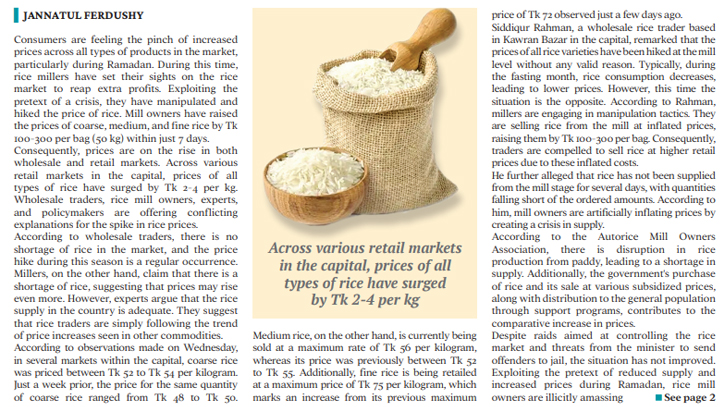
Photo : Messenger
Consumers are feeling the pinch of increased prices across all types of products in the market, particularly during Ramadan. During this time, rice millers have set their sights on the rice market to reap extra profits. Exploiting the pretext of a crisis, they have manipulated and hiked the price of rice. Mill owners have raised the prices of coarse, medium, and fine rice by Tk 100-300 per bag (50 kg) within just 7 days.
Consequently, prices are on the rise in both wholesale and retail markets. Across various retail markets in the capital, prices of all types of rice have surged by Tk 2-4 per kg. Wholesale traders, rice mill owners, experts, and policymakers are offering conflicting explanations for the spike in rice prices.
According to wholesale traders, there is no shortage of rice in the market, and the price hike during this season is a regular occurrence. Millers, on the other hand, claim that there is a shortage of rice, suggesting that prices may rise even more. However, experts argue that the rice supply in the country is adequate. They suggest that rice traders are simply following the trend of price increases seen in other commodities.
According to observations made on Wednesday, in several markets within the capital, coarse rice was priced between Tk 52 to Tk 54 per kilogram. Just a week prior, the price for the same quantity of coarse rice ranged from Tk 48 to Tk 50. Medium rice, on the other hand, is currently being sold at a maximum rate of Tk 56 per kilogram, whereas its price was previously between Tk 52 to Tk 55. Additionally, fine rice is being retailed at a maximum price of Tk 75 per kilogram, which marks an increase from its previous maximum price of Tk 72 observed just a few days ago.
Siddiqur Rahman, a wholesale rice trader based in Kawran Bazar in the capital, remarked that the prices of all rice varieties have been hiked at the mill level without any valid reason. Typically, during the fasting month, rice consumption decreases, leading to lower prices. However, this time the situation is the opposite. According to Rahman, millers are engaging in manipulation tactics. They are selling rice from the mill at inflated prices, raising them by Tk 100-300 per bag. Consequently, traders are compelled to sell rice at higher retail prices due to these inflated costs.
He further alleged that rice has not been supplied from the mill stage for several days, with quantities falling short of the ordered amounts. According to him, mill owners are artificially inflating prices by creating a crisis in supply.
According to the Autorice Mill Owners Association, there is disruption in rice production from paddy, leading to a shortage in supply. Additionally, the government's purchase of rice and its sale at various subsidized prices, along with distribution to the general population through support programs, contributes to the comparative increase in prices.
Despite raids aimed at controlling the rice market and threats from the minister to send offenders to jail, the situation has not improved. Exploiting the pretext of reduced supply and increased prices during Ramadan, rice mill owners are illicitly amassing millions of taka by hiking prices. Retail rice traders noted that while rice prices traditionally remain stable during Ramadan, this time mill owners and large-scale traders have deviated from that norm.
According to sources, a few companies dominate the rice market in the country. Business associations have complained that these companies are arbitrarily raising prices by claiming a shortage in supply. However, government policymakers have stated that the country has more rice in stock than needed, and there is no justification for price hikes. Business leaders have pointed out that currently, rice is scarce in the fields but abundant with millers. Furthermore, corporate traders have entered the market with significant capital, which may impact the rice market.
Consumers have expressed frustration, noting that whenever the government discusses reducing prices, they seem to rise instead. They accuse business syndicates of profiteering while policymakers appear powerless to intervene. Some consumers even speculate that if members of the ruling party hoard rice, it becomes challenging for the government to address the issue effectively. They also allege that certain influential individuals have close ties with the rice hoarders, exacerbating the situation further.
In this regard, Golam Rahman, president of Consumers Association of Bangladesh (CAB) told The Daily Messenger, “Millers are always waiting for opportunities. By creating an artificial shortage of rice on any pretext, the price increases. That happened this time too. So, steps should be taken now to control the price. If not, the suffering of the buyer to buy rice in the market will increase.”
However, there is no shortage of rice in the country, said Masud Karim, Director General of Agriculture Marketing Department. He told The Daily Messenger that there is sufficient stock of rice in government warehouses. That is why the government has stopped the import of rice from abroad.
“We have 16 lakh metric tons of rice stored in our warehouses. The rice market was volatile for a few days after the election but now stable. There is no logical reason for the increase in the price of rice.”
Messenger/Fameema








